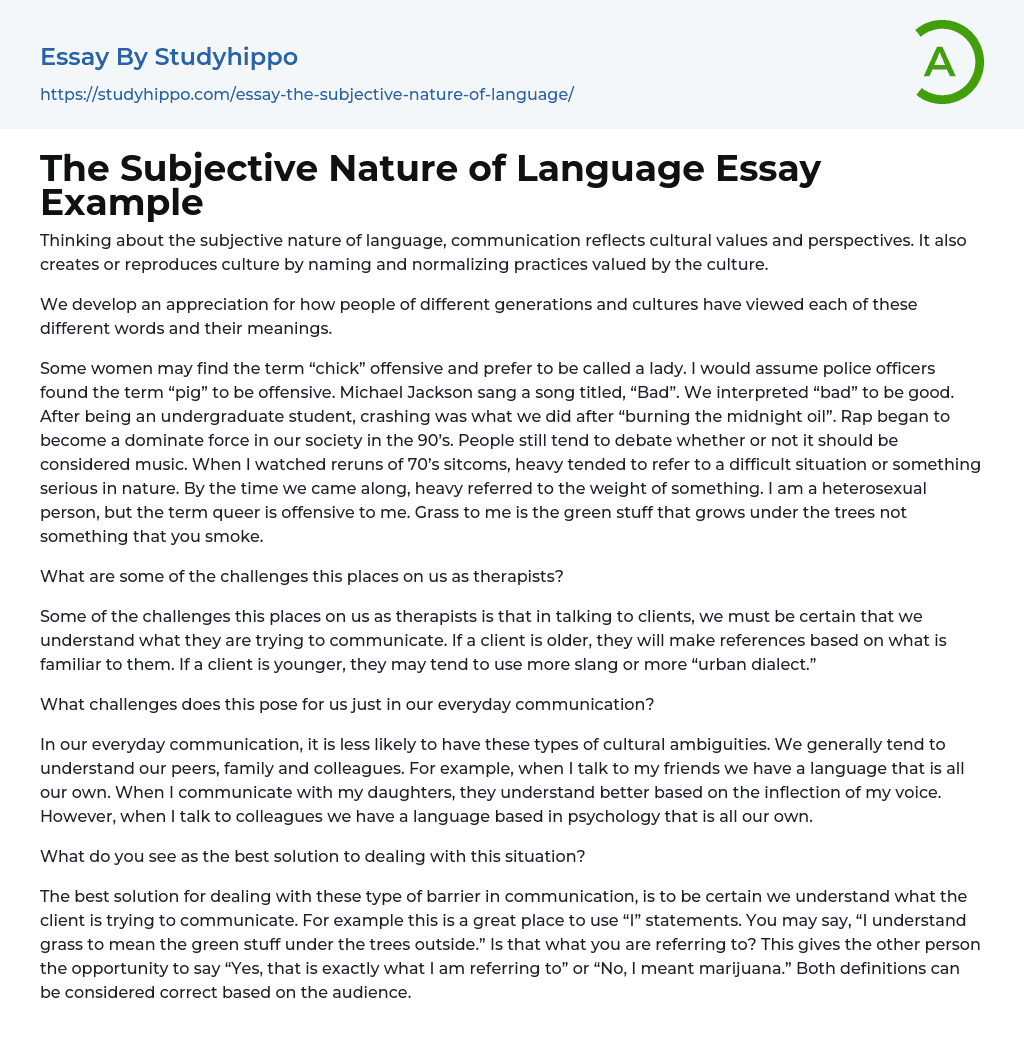Thinking about the subjective nature of language, communication reflects cultural values and perspectives. It also creates or reproduces culture by naming and normalizing practices valued by the culture.
We develop an appreciation for how people of different generations and cultures have viewed each of these different words and their meanings.
Some women may find the term “chick” offensive and prefer to be called a lady. I would assume police officers found the term “pig” to be offensive. Michael Jackson sang a song titled, “Bad”. We interpreted “bad” to be good. After being an undergraduate student, crashing was what we did after “burning the midnight oil”. Rap began to become a dominate force in our society in the 90’s. People still tend to debate whethe
...r or not it should be considered music. When I watched reruns of 70’s sitcoms, heavy tended to refer to a difficult situation or something serious in nature. By the time we came along, heavy referred to the weight of something. I am a heterosexual person, but the term queer is offensive to me. Grass to me is the green stuff that grows under the trees not something that you smoke.
What are some of the challenges this places on us as therapists?
Some of the challenges this places on us as therapists is that in talking to clients, we must be certain that we understand what they are trying to communicate. If a client is older, they will make references based on what is familiar to them. If a client is younger, they may tend to use more slang or more “urban dialect.”
What
challenges does this pose for us just in our everyday communication?
In our everyday communication, it is less likely to have these types of cultural ambiguities. We generally tend to understand our peers, family and colleagues. For example, when I talk to my friends we have a language that is all our own. When I communicate with my daughters, they understand better based on the inflection of my voice. However, when I talk to colleagues we have a language based in psychology that is all our own.
What do you see as the best solution to dealing with this situation?
The best solution for dealing with these type of barrier in communication, is to be certain we understand what the client is trying to communicate. For example this is a great place to use “I” statements. You may say, “I understand grass to mean the green stuff under the trees outside.” Is that what you are referring to? This gives the other person the opportunity to say “Yes, that is exactly what I am referring to” or “No, I meant marijuana.” Both definitions can be considered correct based on the audience.
- Sonnet essays
- Concert essays
- Piano essays
- Hip Hop essays
- Music Reference essays
- Musical Instruments essays
- Mp3 essays
- Recording essays
- Music video essays
- Singing essays
- Song essays
- Tupac shakur essays
- Classical Music essays
- Opera essays
- Rock Music essays
- Blues essays
- Jazz essays
- Sonata essays
- Baroque Music essays
- Rock And Roll essays
- Ludwig Van Beethoven essays
- Michael Jackson essays
- Popular music essays
- Band essays
- Classical Concert essays
- Music Concert Report essays
- Music Awards essays
- Walk This Way essays
- Song Analysis essays
- Oxygen essays
- Atmosphere essays
- Coral Reef essays
- Desert essays
- Earth essays
- Ocean essays
- Lake essays
- Sea essays
- Biodiversity essays
- Natural Environment essays
- Forest essays
- Soil essays
- Water essays
- Rainbow essays
- Ecosystem essays
- Volcano essays
- Wind essays
- Forestry essays
- Bottled Water essays
- Dialect essays
- English Language essays




